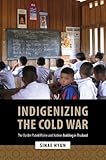Indigenizing the Cold War : The Border Patrol Police and Nation-Building in Thailand / Sinae Hyun.
Material type: TextPublisher: Honolulu : University of Hawaii Press, [2023]Copyright date: ©2023Description: 1 online resource (304 p.) : 9 b&w illustrations, 2 mapsContent type:
TextPublisher: Honolulu : University of Hawaii Press, [2023]Copyright date: ©2023Description: 1 online resource (304 p.) : 9 b&w illustrations, 2 mapsContent type: - 9780824895891
- 363.209593 23/eng/20230130
- HV8252.55.A45
- online - DeGruyter
| Item type | Current library | Call number | URL | Status | Notes | Barcode | |
|---|---|---|---|---|---|---|---|
 eBook
eBook
|
Biblioteca "Angelicum" Pont. Univ. S.Tommaso d'Aquino Nuvola online | online - DeGruyter (Browse shelf(Opens below)) | Online access | Not for loan (Accesso limitato) | Accesso per gli utenti autorizzati / Access for authorized users | (dgr)9780824895891 |
Frontmatter -- Contents -- Preface -- Acknowledgments -- Abbreviations -- Notes on Transliterations and Thai Names -- Notes on Sources and Methods -- Introduction Coming to Terms with Postcolonial Nation-Building and the Cold War -- CHAPTER ONE From CIA Brainchild to Civic Action Agent, 1947–1962 -- CHAPTER TWO Building a Human Border, 1962–1980 -- CHAPTER THREE The Saga of the Black Panther, 1950–1976 -- CHAPTER FOUR Crusade from the Borders to Bangkok, 1969–1976 -- CHAPTER FIVE Mission Incomplete -- Conclusion Whose War Was Cold? -- Postscript The Border Patrol Police in Bangkok Again, 2020 -- Notes -- Bibliography -- Index -- About the Author
restricted access online access with authorization star
http://purl.org/coar/access_right/c_16ec
The Border Patrol Police (BPP) of Thailand was formed as a United States CIA’s paramilitary intelligence force in the early 1950s. In the early 1960s, changes in Thailand’s political leadership and the U.S. government’s strategies for fighting the spread of communism in Southeast Asia led to a transformation of the BPP. The organization became a civic action agency supported by the United States Agency for International Development and the Thai monarchy. Its civic actions, pinned on advancing anticommunist modernization, civilian counterinsurgency, and royalist nationalism, soon extended from the margins to the center of Thailand, and contributed to building the border of “Thainess” (khwam pen thai). The growing tension between the royalist network, consisting of military and rightwing groups, and the democratization movements culminated in a massacre. On October 6, 1976, the Village Scout, a rural vigilante group that the BPP created through its civic actions, and the Police Aerial Reinforcement Unit (PARU), a subunit of the BPP, attacked peaceful protesters at Thammasat University. The success of a military coup on the same day solidified the victory of the royalist network, and it would continue to dominate Thai politics and society into the post–Cold War era.Through a study of the Border Patrol Police’s transformations, Indigenizing the Cold War shows how the Thai ruling elite unfailingly pursued their nation-building. With an introduction of the “indigenization” concept and an in-depth analysis of postcolonial nation-building, this work challenges conventional Cold War studies. The Cold War in Thailand was not always and only about an ideological conflict between the communist and anticommunist. It was a war between the local ruling elite and the people, each pushing forward their visions for constructing a new nation-state. The “indigenization” framework reveals the nature of the collaboration between the global superpowers and the Asian local ruling elite, who took advantage of the American Cold War for legitimizing and continuing their authoritarian regimes.
Mode of access: Internet via World Wide Web.
In English.
Description based on online resource; title from PDF title page (publisher's Web site, viewed 06. Mrz 2024)


